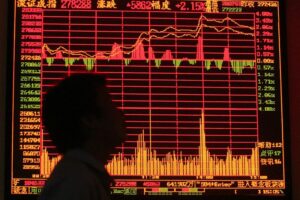
Nvidia (NVDA 1.06%) has delivered staggering, market-beating gains, but would you believe it hasn’t always been that way? You don’t have to go back far to see when it has struggled — Nvidia stock lost a full 50% of its value in 2022.
Investors who didn’t buy Nvidia stock during that down period might be kicking themselves since those steep losses were immediately followed by the artificial intelligence craze that has been fueling the stock (and the broad market) for almost two years now. But if that’s you, don’t feel too bad. Very few people understood the changes generative AI would usher in for the world.
If you do own Nvidia stock and have benefited from its incredible gains recently, you should keep in mind there’s real debate about how long its streak can go on. It’s up over 700% since the beginning of 2023, it trades at a high valuation, and the company is facing increasing competition. There’s likely to be significant pullback at some point — here’s how to keep it from upending your portfolio.
Diversification, diversification, diversification
The old adage about not putting all your eggs in one basket is well-known because it’s true. Even if you own shares in one of the best companies on the planet, which Nvidia undoubtedly is, there are no guarantees regarding its future performance. Holding just one stock, or letting it make up an outsized percentage of your portfolio, is a major risk. Even the best of companies can run into all sorts of unforeseen challenges.
With that in mind, putting your investment eggs in different baskets, so to speak, can happen in a few ways. There are layers of diversification, and the more fully diversified your portfolio is across various types of categories, the more protection it will have.
First, there are different kinds of investments. Beyond the stock market, which includes individual stocks, exchange-traded funds (ETF), and options, there’s real estate, bonds, cryptocurrencies, and savings accounts, among others.
Even within the stock market, there are different kinds of stocks: growth stocks, value stocks, dividend stocks, blue chips, and other classifications. You can also break stocks down by industry, geography, or market capitalization.
Diversification across these categories can protect you from a downturn in any one asset class, industry, region, etc. A good rule of thumb is to have around 25 to 30 holdings in your stock portfolio, but if that sounds overly complicated, consider a few ETFs. The most popular ones track major indexes like the S&P 500, giving you instant exposure to the hundreds of stocks within the index.
Does it make sense to sell Nvidia stock?
Some long-term investors prefer a “set it and forget it” approach to their holdings. If you buy great stocks and hold through thick and thin, you should be able to generate strong long-term gains. But even these investors need to occasionally review their portfolios to see if any adjustments are necessary to support their investing goals.
And this brings us to the dilemma for Nvidia shareholders. What happens when a stock appreciates in value and accounts for too large a portion of your overall portfolio?
Let’s say you originally allocated 5% of your portfolio to Nvidia, but because the stock has climbed so quickly, it now makes up over 25% of your holdings. This is a case where you might want to sell some Nvidia stock and redistribute those funds to bring your portfolio back into a more risk-ready allocation. It may seem counterintuitive to reduce your exposure to a great company, but such a move can be necessary to bring your portfolio in line with your investing goals.
I’ll give you two recent examples of billionaire investors making high-profile sales of excellent stocks. First, Warren Buffett recently trimmed his stake in Apple by selling an estimated $20 billion of shares in the first quarter. But investors shouldn’t mistake that for any loss of confidence in the company — it still accounts for nearly 43% of Berkshire Hathaway‘s entire portfolio. Meanwhile, Bill Ackman recently sold 10% of his position in Chipotle Mexican Grill. Even with that sale, it remains the largest position in the Pershing Square Capital portfolio at 20%.
Finally, several billionaire investors have recently sold part of their stake in Nvidia, including Citadel Advisors’ Ken Griffin, Millennium Management’s Israel Englander, and Two Sigma’s John Overdeck and David Siegel.
Nvidia’s current momentum won’t last forever. When the pullback eventually comes, it doesn’t have to roil your entire portfolio if you take the steps to diversify your holdings based on your risk tolerance and investing goals.
Jennifer Saibil has no position in any of the stocks mentioned. The Motley Fool has positions in and recommends Apple, Berkshire Hathaway, Chipotle Mexican Grill, and Nvidia. The Motley Fool has a disclosure policy.










